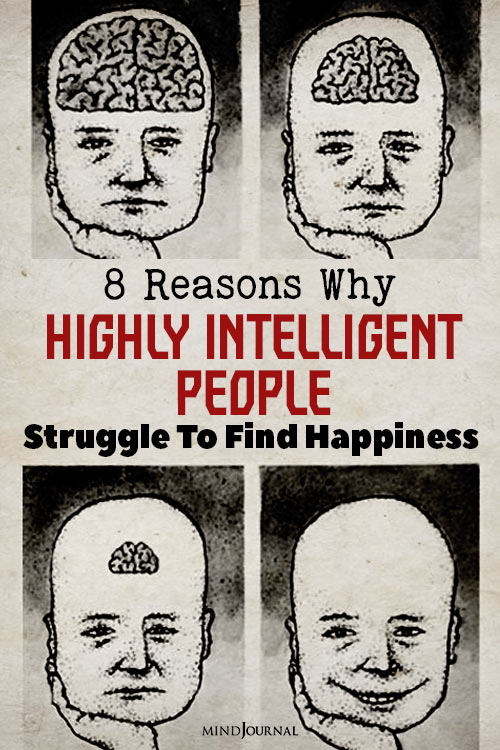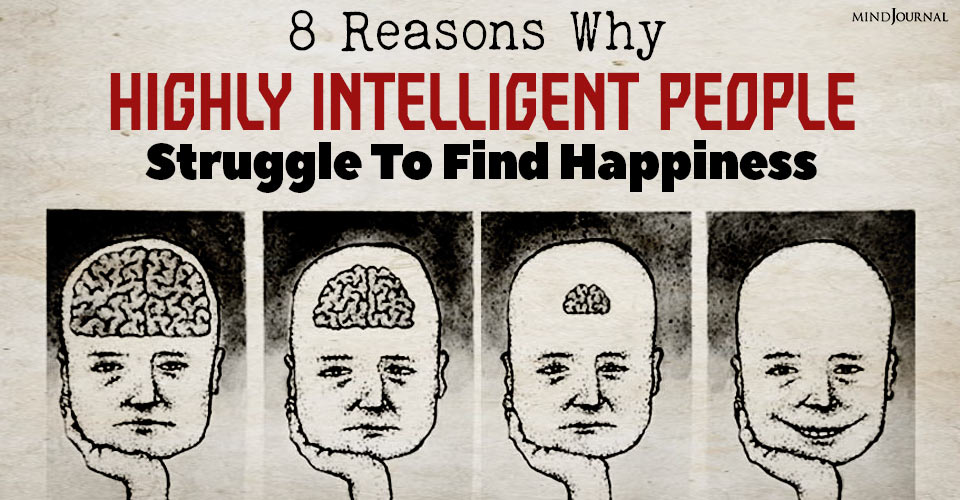Happiness is an elusive feeling that most of us struggle to experience. But highly intelligent people stay unhappy and often seem to stumble a lot more in their pursuit of happiness.
While the human mind is one of the greatest tools created by nature, it can be an unexpected obstacle in our path to happiness.
But what exactly is happiness?
Happiness is not a place. It’s not a destination that we need to reach. It is a state of mind that we need to experience.
Happiness is the feeling of joy, satisfaction and contentment. It is a sense of overall well-being. Different people feel happy for different reasons.
Most of us feel happy when we have a good family life, a healthy romantic relationship, a successful career, good health and enough time to pursue our interests.
Read What Is True Happiness? 10 Signs Of A Genuinely Happy Person
Then why are highly intelligent people unable to pursue happiness?
Because highly intelligent people think a little too much. And thinking is the key ingredient for unhappiness. In fact, studies show that highly intelligent people are vulnerable to developing mood disorders, like depression and bipolar disorder.
As they are very goal-oriented, highly intelligent individuals try to “create” their own happiness. They are prone to living inside their own mind and constantly think about their past and future. And it is their tendency to overthink which destroys their happiness and mood.
Why intelligent people stay unhappy
Are you highly intelligent? Do you have a hard time finding happiness?
Here are 8 psychological reasons why highly intelligent people struggle with finding happiness:
1. They over-analyze everything
People with high intelligence and IQs are overthinkers. They constantly analyze everything around them in detail to make sure that they make the best decisions at all times.
While being able to analyze everything so closely can be a valuable asset, it can cause a great deal of frustration as well. Highly intelligent people are usually uncertain about their
2. They are extremely self-aware
When you understand everything, it becomes harder to accept certain things, especially undesired outcomes. Perhaps ignorance truly is bliss.
With high levels of intelligence comes high levels of awareness. Smart people are highly aware of their surroundings, but they are even more aware of themselves. As they are more prone to succeed in life, they are extremely attentive of their skills, abilities and performance.
They are always aware of everything they do and monitor their actions and interactions constantly. This can trigger severe anxiety, making them feel dissatisfied and exhausted.
3. They have high standards
Highly intelligent people don’t settle for less as they know they can do better. They hold really high standards in everything, which can often be unrealistic at times.
So, no matter what they achieve, highly intelligent people are rarely satisfied with what they have, whether in their career or in relationships. This leads to disappointment and frustration, making them unhappy in life.
Due to their idealistic views of the world they often get heartbroken when facing reality.
4. They are highly self-critical
Creative and intelligent minds often doubt their own capabilities and accomplishments. They experience a lot of internal struggles and so they are overly self-critical and too hard on themselves.
They are prone to self-blame, self-criticism and self-hatred and struggle with loving themselves. They constantly reflect on past events and are filled with self-doubt, guilt, grievances and dissatisfaction which affects their mood and happiness.
5. They socialize less than others
Highly intelligent people don’t prefer wasting their time socializing and making small talk. They are more interested in thinking about novel ideas, concepts & theories and investing their time in executing those ideas.
So they often feel socially isolated as they are unable to relate to others. They are widely misunderstood, making them avoid social interactions. This drives them towards loneliness, depression and unhealthy attachment styles.
Read Why Intelligent People Choose To Be Less Social
6. They get bored easily
Intelligent people are always curious about things and are driven by the relentless pursuit of knowledge. As their mind is constantly engaged in processing new information and entangled in the process of creativity, they often find reality too boring.
But chasing one idea after the other without allowing time to focus on something to grow and thrive can spell failure. So when they are compelled to face the reality of our world, highly intelligent people can easily become disappointed and depressed.
7. They suffer from psychological conditions
Multiple studies have found that highly intelligent people tend to develop psychiatric disorders like depression, bipolar disorders, schizophrenia and anxiety disorders.
Highly intelligent people are exceptionally responsive to their environment and this hyper-reactivity can cause depression and anxiety disorders. Their habit of over analyzing and self-reflecting on the purpose of life can also lead to mental health issues and prevent them from being happy.
8. They don’t seek happiness
Highly intelligent people tend to devalue happiness. Due to their habit of overthinking, highly intelligent people make happiness seem like a complex, unattainable goal that needs to be earned and cannot simply be enjoyed. So they feel ashamed and guilty for feeling happy when it doesn’t feel deserved to them.
They believe that happiness is too complex of a goal to achieve, so they seek other goals instead. Their habit of being self-critical makes them self-sabotage their own happiness.
Do you struggle with finding happiness?
Have you observed these signs in yourself or someone you know?
Intelligence is a double edged sword that can take us to the highest highs and lowest lows. While highly intelligent people are more likely to succeed than others, they often cope with depression and other psychological issues that keep them from experiencing genuine happiness.
But happiness is a relative concept and each of us have a different definition of happiness.
If you are struggling with depression or anxiety, then consulting a mental health professional can help you live a more satisfying and happier life.









Leave a Reply
You must be logged in to post a comment.